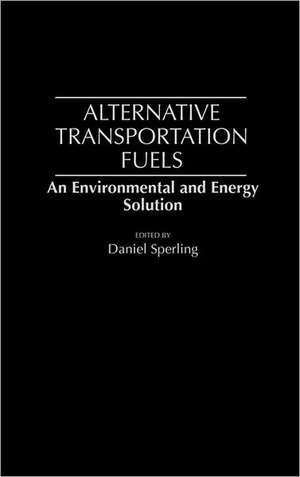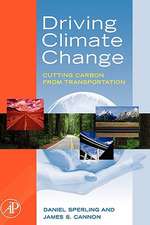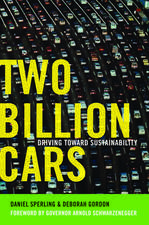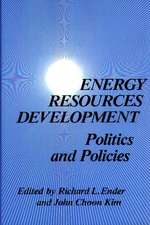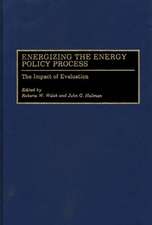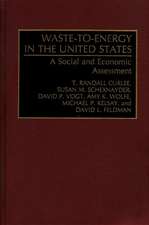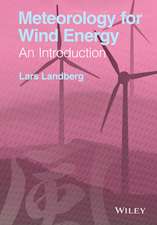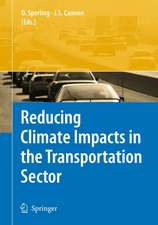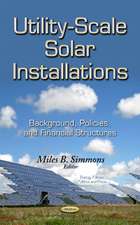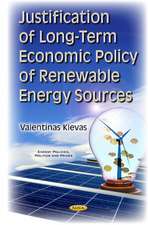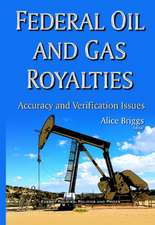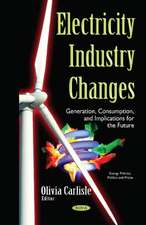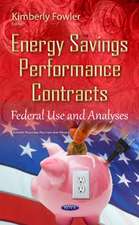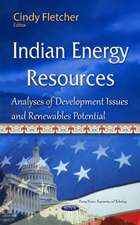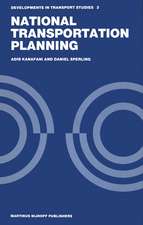Alternative Transportation Fuels: An Environmental and Energy Solution
Editat de Daniel Sperlingen Limba Engleză Hardback – 30 sep 1989
Throughout the 1970s and the 1980s, energy policy has been a hotly debated topic. Governments around the world have struggled to respond to a changing energy market. Yet the policy-making process is all too often distorted by self-interest groups who are informed by narrow, technical research. The question addressed by this volume is one of the most timely and critical of the energy-related questions: How much longer can we rely on petroleum as a transportation fuel? This book, which includes a subset of papers commissioned for an unusual symposium (Alternative Transportation Fuels of the 1990s and Beyond, July 17-19, 1988), addresses the broader issues of transportation-fuel policy in regard to energy security, economic growth, and environmental quality. While many conferences have addressed the subject of alternative fuels, their scope has been intensive and narrow, focusing on a few specific areas in the spectrum of possibilities. This conference was the first in many years to offer such a broad exploration of alternative fuels. Presenters included influential executives and administrators from the Department of Energy, and the motor vehicle and energy industries; federal, state, and local governments; environmental groups as well as leading researchers in the fields of air quality analysis, motor vehicle technology, and energy policy.
In addition to an introduction and conclusion by Daniel Sperling, a total of 17 papers are presented in this volume. What is most exceptional and exciting about this collection is the presentation of contrasting views and the sharing of this wealth of information with a broader audience. Examined here are global fuel strategy, ethanol fuels in Brazil, alternative fuels as a solution to the air quality problem, Chevron's view of the future of oil, and the role of government in promoting alternative transportation fuels. Methanol, compressed natural gas, and hydrogen-powered and electric vehicles are also discussed. In addition to the analytical papers, the volume also includes a short article representing the viewpoint of an environmentally minded citizen. This book should appeal to any individual involved or interested in this important area. Researchers will appreciate the opportunity to consider so many well-researched but varying perspectives. It will be essential--and perhaps should be required reading--for policy makers, providing them with an overview of the issues and helping them make more intelligent, effective, and strategic choices. For the general public--those who are affected by energy and transportation policies--it is a unique opportunity to gain a broad understanding of our transportation fuel options and their environmental and economic consequences.
Preț: 440.36 lei
Preț vechi: 605.66 lei
-27% Nou
84.27€ • 87.48$ • 70.27£
Carte tipărită la comandă
Livrare economică 22 martie-05 aprilie
Specificații
ISBN-10: 0899304079
Pagini: 342
Dimensiuni: 156 x 234 x 21 mm
Greutate: 0.66 kg
Ediția:New.
Editura: Quorum Books
Descriere
In addition to an introduction and conclusion by Daniel Sperling, a total of 17 papers are presented in this volume. What is most exceptional and exciting about this collection is the presentation of contrasting views and the sharing of this wealth of information with a broader audience. Examined here are global fuel strategy, ethanol fuels in Brazil, alternative fuels as a solution to the air quality problem, Chevron's view of the future of oil, and the role of government in promoting alternative transportation fuels. Methanol, compressed natural gas, and hydrogen-powered and electric vehicles are also discussed. In addition to the analytical papers, the volume also includes a short article representing the viewpoint of an environmentally minded citizen. This book should appeal to any individual involved or interested in this important area. Researchers will appreciate the opportunity to consider so many well-researched but varying perspectives. It will be essential--and perhaps should be required reading--for policy makers, providing them with an overview of the issues and helping them make more intelligent, effective, and strategic choices. For the general public--those who are affected by energy and transportation policies--it is a unique opportunity to gain a broad understanding of our transportation fuel options and their environmental and economic consequences.
